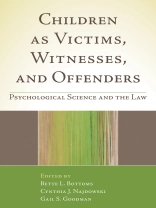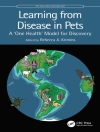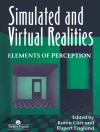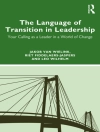Grounded in the latest clinical and developmental knowledge, this book brings together leading authorities to examine the critical issues that arise when children and adolescents become involved in the justice system. Chapters explore young people’s capacities, competencies, and special vulnerabilities as victims, witnesses, and defendants. Key topics include the reliability of children’s abuse disclosures, eyewitness testimony, interviews, and confessions; the evolving role of the expert witness; the psychological impact of trauma and of legal involvement; factors that shape jurors’ perceptions of children; and what works in rehabilitating juvenile offenders. Policies and practices that are not supported by science are identified, and approaches to improving them are discussed.
Inhaltsverzeichnis
1. Children as Victims, Witnesses, and Offenders: An Introduction through Legal Cases, Jillian N. Ducker, Jessica M. Salerno, Cynthia J. Najdowski, Bette L. Bottoms, and Gail S. Goodman
I. Children as Victims and Witnesses
2. Abuse Disclosure: What Adults Can Tell, Thomas D. Lyon
3. Trauma and Memory, Andrea Follmer Greenhoot and Sarah L. Bunnell
4. Children’s Memory in Forensic Contexts: Suggestibility, False Memory, and Individual Differences, Iris Blandón-Gitlin and Kathy Pezdek
5. Child Sexual Abuse Investigations: Lessons Learned from the Mc Martin and Other Daycare Cases, James M. Wood, Debbie Nathan, M. Teresa Nezworski, and Elizabeth Uhl
6. Contemporary Child Forensic Interviewing: Evolving Consensus and Innovation Over 25 Years, Karen J. Saywitz and Lorinda B. Camparo
7. Child Victims in Dependency Court, Jodi A. Quas, Alexia Cooper, and Lindsay Wandrey
8. Child Witnesses in Criminal Court, Natalie R. Troxel, Christin M. Ogle, Ingrid M. Cordon, Michael J. Lawler, and Gail S. Goodman
9. Expert Psychological Testimony in Child Sexual Abuse Trials, John E. B. Myers
10. Jurors’ Perceptions of Children’s Eyewitness Testimony, Jonathan M. Golding, Emily E. Dunlap, and Emily C. Hodell
11. An International Perspective on Child Witnesses, Kay Bussey
12. Child Victim Research Comes of Age: Implications for Social Scientists, Practitioners, and the Law, Bradley D. Mc Auliff
II. Children as Offenders
13. How Victims Become Offenders, Cathy Spatz Widom and Helen W. Wilson
14. Police Interrogation and False Confessions: The Inherent Risk of Youth, Allison D. Redlich and Saul M. Kassin
15. Challenging Juvenile Transfer: Faulty Assumptions and Misguided Policies, N. Dickon Reppucci, Jaime L. Michel, and Jessica O. Kostelnik
16. Therapeutic Jurisprudence in Juvenile Justice, Patrick H. Tolan and Jennifer Anne Titus
17. Girl Offenders: Special Issues, James Garbarino, Kathryn Levene, Margaret Walsh, and Sacha M. Coupet
18. Understanding Adults’ Perceptions of Juvenile Offenders, Margaret C. Stevenson, Cynthia J. Najdowski, Bette L. Bottoms, and Tamara M. Haegerich
19. An International Perspective on Juvenile Justice Issues, John Petrila
20. Different Visions of Juvenile Justice, Christopher Slobogin
Über den Autor
Bette L. Bottoms, Ph D, is Professor of Psychology and Dean Emerita of the Honors College at the University of Illinois at Chicago. She has published numerous articles and books about child abuse, children’s eyewitness testimony, and jurors‘ perceptions of child victims and offenders. A past president of the American Psychological Association’s Society for Child and Family Policy and Practice, she is a recipient of the American Psychology–Law Society Early Career Award and eight awards for teaching excellence.
Cynthia J. Najdowski, BA, is a doctoral student in social and personality psychology at the University of Illinois at Chicago. Her research focuses on understanding how childhood sexual abuse and rape victims cope with their experiences. She also studies perceptions of juvenile offenders. She has received several competitive grants and awards in recognition of her work.
Gail S. Goodman, Ph D, is Distinguished Professor of Psychology and Director of the Center for Public Policy Research at the University of California, Davis. She has received numerous awards and federal grants for research, and her studies have been cited in U.S. Supreme Court decisions. Her psycholegal research focuses on child maltreatment, trauma and memory, forensic interviewing, and juvenile delinquency.












